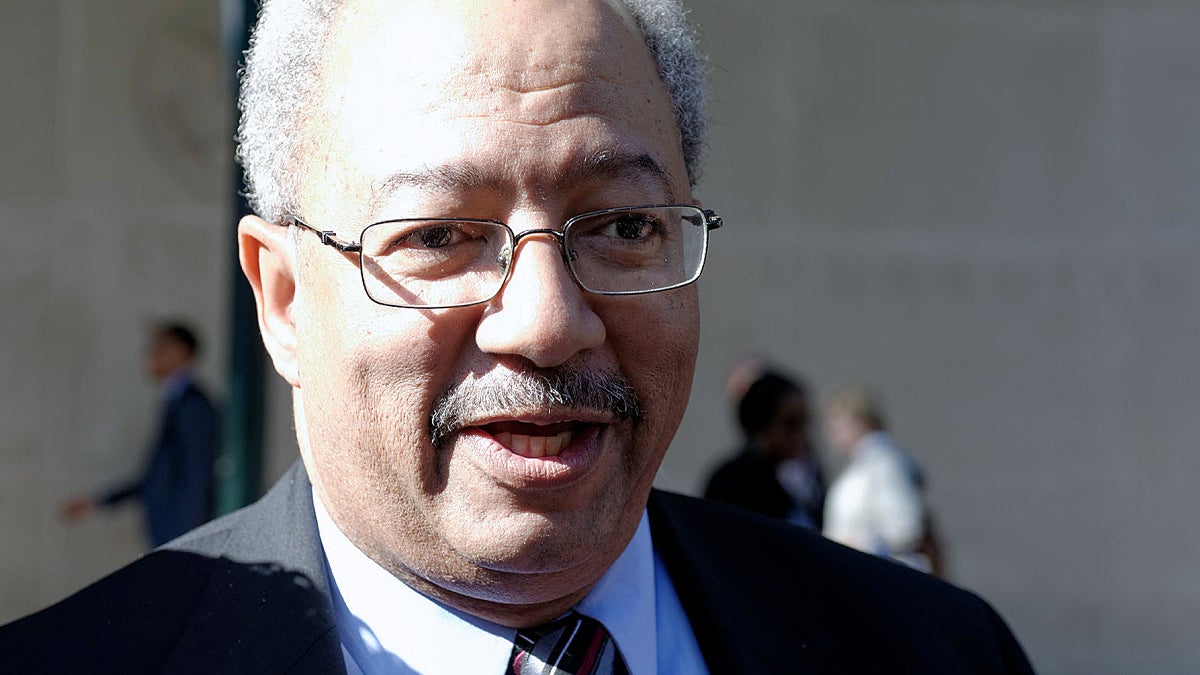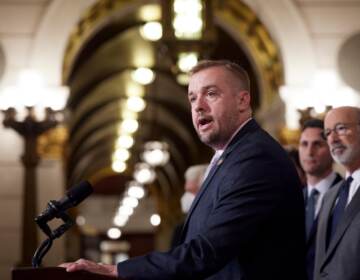Old friend implicates Fattah in theft of funds
Listen
U.S. Rep. Chaka Fattah appears at the U.S. Courthouse in Philadelphia last week at the start of his trial on corruption charges. (Bastiaan Slabbers for NewsWorks)
A longtime friend of Philadelphia Congressman Chaka Fattah took the witness stand at his federal corruption trial Wednesday, and tied Fattah directly to an alleged theft of government and charitable funds.
Anyone familiar with Philadelphia politics over the past 25 years knows the name of Gregory Naylor. He’s known for organizing massive field efforts to get out the African-American vote in city elections, and he goes way back with Fattah.
Naylor, who has worked for Fattah on his government staff, was a key political operative in Fattah’s 2007 mayoral campaign.
Naylor told the jury he heard from Fattah directly in 2008 that the congressman was fully aware of the movement of $600,000 in grant and government funds to repay an illegal loan to his campaign — a chain of transactions prosecutors say amounts to theft.
The movement of money from a nonprofit that received government grants to a for-profit business to another political consultant — all of it allegedly covered by phony contracts — is at the heart of the most serious charge against Fattah.
Naylor said it was clear from his conversations with Fattah that he knew all the details of the transaction, though he didn’t recall specific words.
“I can’t give you a script,” Naylor said at one point about discussions that occurred years ago.
Money for Junior
Naylor also testified that Fattah personally instructed him make thousands of dollars in college tuition and student loan payments for his son, Chaka Fattah Jr., payments then illegally reimbursed from Fattah’s campaign funds.
And Naylor testified that he created phony tax documents to make it appear Fattah, Jr., known as “Chip,” had earned the money by working for Naylor’s consulting firm. Naylor was clear that Chip did no work for the money.
Who didn’t get paid?
Earlier in the day, some vendors and lawyers testified that they struggled to get paid for real work they did during the campaign while money went for Chip Fattah’s educational bills.
Robert Dilella said it took him four years from the end of the campaign to recoup money owed to his print communications firm for direct mailers it designed, printed and mailed.
Even then, he wasn’t paid in full.
After Fattah lost the Democratic primary in 2007, Dilella said the campaign owed him roughly $118,000. By 2011, the campaign still technically owed him $25,000, though Dilella forgave the sum.
But, by then, Dilella had been through plenty of frustration and anger. He recounted a fiery call with former City Councilman George Burrell after Dilella threatened to sue Fattah and the campaign to get the money still owed to him.
“Do you really want to sue a sitting member of Congress?” Dilella recalled Burrell asking.
Dilella became “enraged” and said he told Burrell that Fattah’s status had nothing to do with the debt he owed.
“I don’t live large, and this is a lot of money to me,” Dilella told Burrell.
When asked by Burrell how to resolve the matter, Dilella had a straightforward answer: “Pay the f——- bill.”
Fattah hired election lawyer Gregory Harvey to help keep the campaign financially compliant.
After the election, the campaign owed Harvey roughly $84,000 for legal fees and representation.
After a meeting with Herbert Vederman, one of Fattah’s co-defendants, Harvey’s law firm ultimately agreed to forgive $40,000 of that debt.
The rest was largely paid off in $5,000 monthly installments.
Harvey said he never knew anything about Fattah allegedly using campaign cash to help his son.
Whom do you trust?
While there’s plenty of documentation of the transactions in the government charges, there are so far no emails, notes or recordings of Fattah directing any of the crimes.
Much will come down to the clarity of the paper trial and, even more, the credibility of the witnesses.
Naylor has pleaded guilty in the case and is testifying in hopes of getting a reduced sentence.
Fattah’s attorney Mark Lee suggested in his cross-examination that Naylor had told different versions of his understanding of Fattah’s knowledge of the alleged crimes in earlier meetings with prosecutors, or in his testimony before a grand jury.
Naylor said things might have come out differently at times depending on the questions he was asked, but said he was clear about the basic fact that Fattah was aware of the details of the campaign loan and its repayment.
WHYY is your source for fact-based, in-depth journalism and information. As a nonprofit organization, we rely on financial support from readers like you. Please give today.





